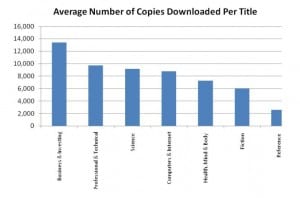A Book Piracy Study with Surprising Results

Content tracking company Attributor has come forward with the results of another study, this time on the topic of book piracy.
Though the title “Online Book Piracy Costs U.S. Publishers Nearly $3 Billion” may be a bit of an exaggeration, for reasons I’ll explain in a minute, the study itself (PDF) is an interesting peek into how piracy is affecting the book industry and the specific areas that are seeing the largest impact.
Those findings, while likely eye-opening to the book publishing industry, are also useful for bloggers and other writers on the Web, especially those who market downloadable eBooks and other content for sale.
With that in mind, let’s take a look at the study and what it actually means.
Methodology
Attributor, using its FairShare Guardian system, monitored piracy for 913 popular books that made up a cross-section of the current book publishing industry by tracking the works across the top 25 file hosting sites for 90 days beginning in October 2009.
The company also tracked the number of downloads that the books received on sites where the information was available (four out of the 25) and from there, based on traffic estimates, projected the total amount of piracy for each book and for the entire sample. From there, the value of the books was estimated and that amount was, in turn, projected on the industry at large.
It’s important to note that this study does come with several limitations including that there was no monitoring of P2P sources, such as Bittorrent sites, and the study does not make any attempt to estimate the actual financial loss the industry suffered due to the piracy as it refuses to make a guess as to the number of illegal downloads that otherwise would have been sales.
Despite the limitations, including the admitted guesswork and projections, there is a lot of interesting information in the report.
Results
According to the study, Attributor tracked some 3.2 million downloads of the books. Given the estimated market share of those sites, they estimated that some 9 million copies were downloaded in total for a total market value of $380 million. That, in turn, becomes an estimate $2.8 billion when looking at the entire industry.
But while those numbers have a lot of caveats and estimations, there are some hard numbers within the study itself that are very interesting for Webmasters and book publishers alike, including the following:
- Business and investing was the most downloaded genre of book, with almost 14,000 downloads per book. Professional and technical books were second, with almost 10,000 average. Fiction books fared somewhat better, about 6,000 downloads per book and reference books were the least downloaded, about 2,000 downloads per book.
- The potential lost sales per title were highest among business and investing, professional and technical as well as science books, all of which had en estimated potential loss of over $1 million per title. Fiction and reference books had an average potential loss of less than 1/10th that amount.
- Regarding hosting sites, book piracy was by far the most common at rapidshare and 4shared, the two sites having nearly 70% of the market share.
The impact of this is pretty clear. If your content fits into one of the niches that is commonly pirated, you should definitely be aware of the dangers and either you or your publisher should be ready to take action. Also, it gives you an idea as to the sites to be watching closely as they are likely candidates for your work to appear, with or without your permission.
Also, however, it may be an opportunity as well. Knowing that there is a genuine desire for free electronic books on certain topics may open the doors for other authors to exploit that market legitimately while allowing the traditional publishing market to thrive as well.
Either way, this is some very useful intelligence on what is going on with book piracy and the usefulness of this information go well beyond just the publishing industry.
Bottom Line
For me there were a few surprises in the study. Though I expected technology books to be routinely pirated, both due to the target audience and following my friend Patrick O’Keefe’s trials with piracy regarding his own book, I was surprised to see business and investing take the top slot. Likewise, I was also surprised to see fiction rated so low, especially considering my own work as a fiction author.
Though the extreme difference in potential monetary losses is largely due to the different price structures for the two kinds of works, business books also saw the most downloads per work.
In that regard alone the study has shifted some of the ways I think about piracy and content and made me take a longer look at the business and investing genres of work. For authors and creators in that field, this should be a wake up call.
Even though there is a fair amount of admitted guesswork and “ifs” in the study, it is clear that it is not one that can be easily ignored, especially if you are writing in the business or investing field.
Disclosure: I have previously consulted for Attributor and they are a technology partner for my current company, CopyByte.com
Want to Reuse or Republish this Content?
If you want to feature this article in your site, classroom or elsewhere, just let us know! We usually grant permission within 24 hours.

